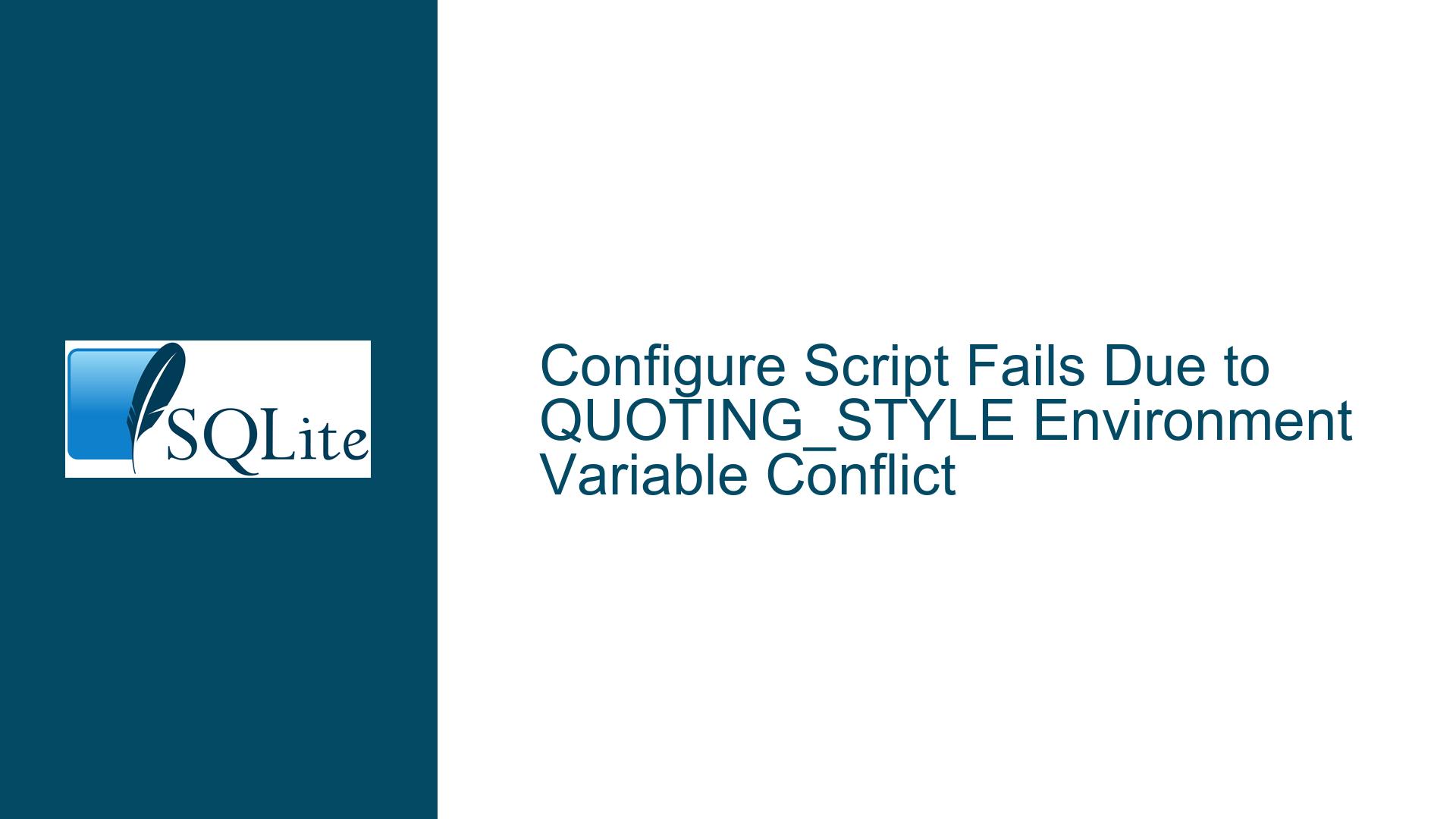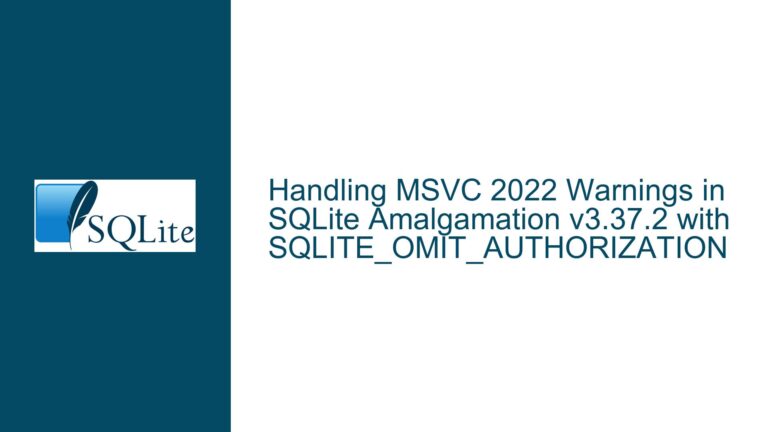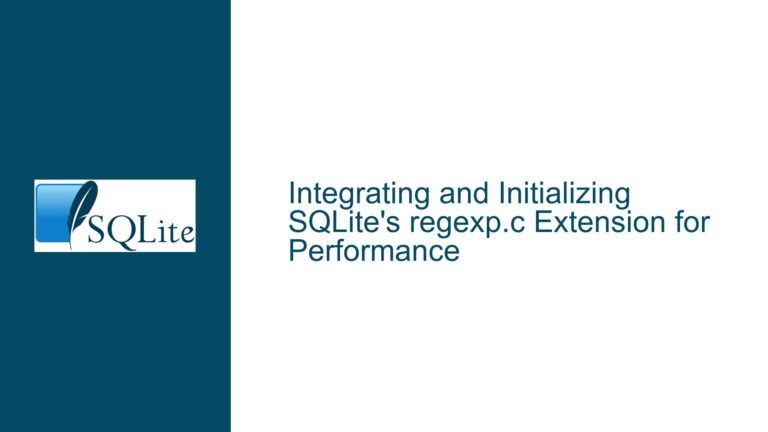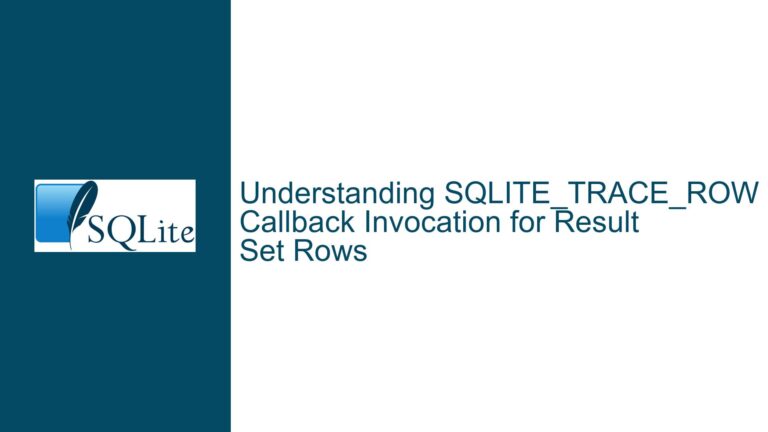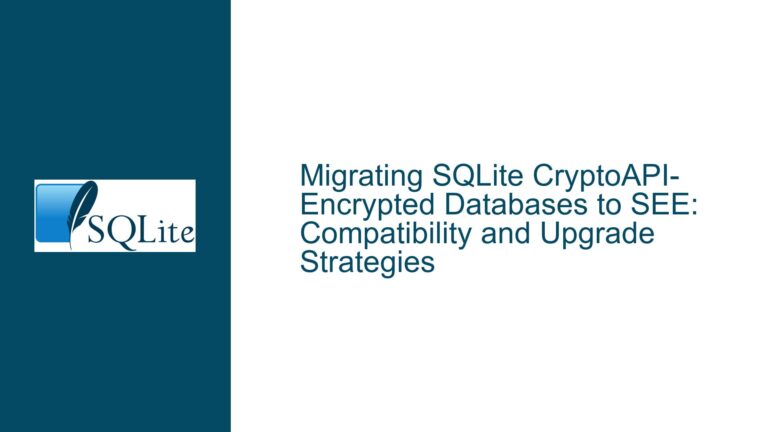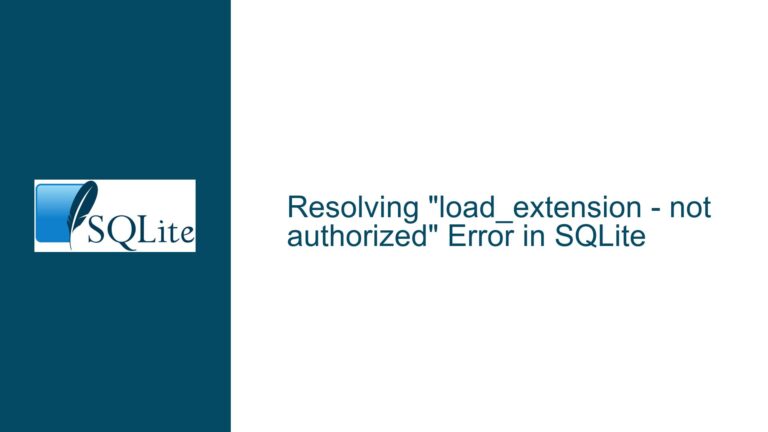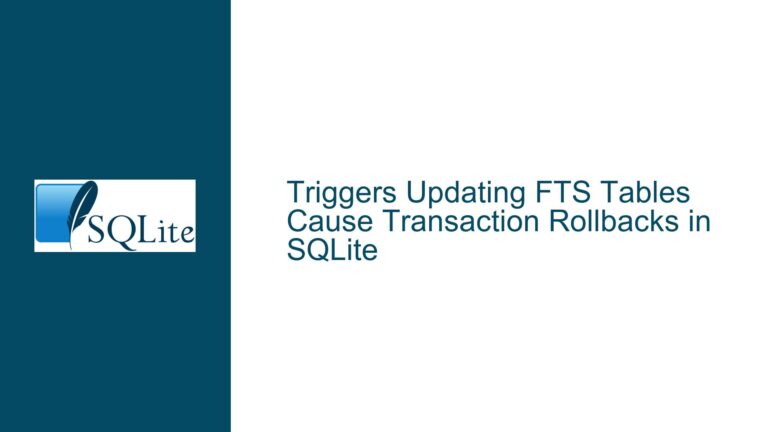Configure Script Fails Due to QUOTING_STYLE Environment Variable Conflict
Environment Variable Inheritance and Autoconf Script Compatibility
The SQLite configure script, part of the autoconf-generated build system, relies on parsing output from system utilities and internal checks to detect platform-specific configurations. When the QUOTING_STYLE environment variable is set to values like shell-always, it modifies how certain tools (e.g., ls, m4, or text-processing utilities) handle string escaping and quotation marks. This variable, though primarily associated with GNU Coreutils’ ls command, is inherited by subprocesses spawned during the configure script’s execution. If a tool used by configure interprets QUOTING_STYLE in a way that alters its output formatting, the script may encounter syntax errors, unexpected tokenization, or misparsed data. For example, shell-always forces quoted output strings even when unnecessary, introducing extraneous quotation marks in filenames, paths, or compiler flags. The configure script’s logic, which expects unquoted or minimally quoted input, then fails to process these values correctly, leading to abrupt termination during build configuration.
This issue is particularly insidious because QUOTING_STYLE is not a variable developers typically associate with build systems. Its presence in a user’s shell environment—often set globally in .bashrc, .profile, or other initialization files—can persist across sessions and interfere with unrelated workflows. The conflict arises from the broader impact of environment variables on toolchain behavior, a detail that autoconf-based scripts do not always account for. The SQLite build system, while robust, does not explicitly sanitize or override this variable, leaving the configuration process vulnerable to misconfigured environments.
Overlapping Toolchain Dependencies and Variable Propagation
The root cause of the failure lies in the interaction between environment variables, shell toolchain utilities, and the assumptions made by autoconf-generated scripts. Autoconf relies on a suite of text-processing tools (e.g., sed, awk, grep) and macro processors (e.g., m4) to generate platform-specific build configurations. These tools may interpret QUOTING_STYLE differently depending on their implementation. For instance, GNU m4 might apply quotation rules defined by QUOTING_STYLE when expanding macros, inadvertently injecting quotes into variable assignments or command substitutions. Similarly, tools that format diagnostic messages or file listings could return quoted strings where the configure script expects raw, unquoted text.
Another layer of complexity stems from the recursive nature of environment variable inheritance. Child processes spawned by the configure script inherit the parent shell’s environment, including QUOTING_STYLE. If any subprocess—even indirectly invoked ones—depends on a utility that respects QUOTING_STYLE, its output may deviate from expectations. For example, a compiler check that inspects header files might invoke a helper script that lists directories using ls, and with QUOTING_STYLE=shell-always, the directory paths returned could include quotes. The configure script, attempting to parse these paths as bare strings, would treat the quotes as literal characters, resulting in invalid paths or syntax errors.
The problem is exacerbated by the lack of isolation in build environments. Most autoconf scripts do not rigorously sanitize the environment before execution, assuming instead that developers will use "clean" shells for critical workflows. This assumption breaks down when variables like QUOTING_STYLE are set persistently in user profiles. Furthermore, the variable’s effects may manifest only in specific phases of the configure process, making it difficult to diagnose without targeted logging or instrumentation.
Diagnosing, Mitigating, and Resolving QUOTING_STYLE Conflicts
Step 1: Confirm Environment Variable Presence
Before executing the configure script, verify whether QUOTING_STYLE is set in the current shell:
env | grep '^QUOTING_STYLE='
If this command returns a value (e.g., QUOTING_STYLE=shell-always), the variable is active and likely contributing to the failure.
Step 2: Temporarily Unset QUOTING_STYLE
Run the configure script in a subshell where QUOTING_STYLE is unset:
(unset QUOTING_STYLE; ./configure)
This isolates the script from the variable without altering the parent shell’s environment. If the script completes successfully, QUOTING_STYLE is confirmed as the culprit.
Step 3: Modify Shell Initialization Files
To prevent future conflicts, remove or comment out lines that set QUOTING_STYLE in shell startup files (e.g., ~/.bashrc, ~/.zshrc, ~/.profile):
# Example: Edit .bashrc
nano ~/.bashrc
# Locate and comment: export QUOTING_STYLE="shell-always"
After editing, reload the configuration:
source ~/.bashrc
Step 4: Localized Variable Unsetting for Build Scripts
For build systems or automation tools that invoke configure directly, prepend the command with unset:
unset QUOTING_STYLE && ./configure
This ensures the variable is unset only for the duration of the build process.
Step 5: Patching the Configure Script (Advanced)
If permanently modifying the environment is not feasible, patch the configure script to unset QUOTING_STYLE internally. Insert the following line near the script’s beginning:
unset QUOTING_STYLE
Use a text editor or scriptable patching tool (e.g., sed):
sed -i '2iunset QUOTING_STYLE' configure
This edit forces the script to discard the variable upon execution, shielding it from external influences.
Step 6: Validate Toolchain Behavior
Investigate whether other utilities in the build chain respect QUOTING_STYLE. For example, test ls and m4 with the variable set:
QUOTING_STYLE=shell-always ls
QUOTING_STYLE=shell-always m4 --version
Observe if their output includes unexpected quotes or formatting. If so, consider creating wrapper scripts that unset the variable before invoking these tools.
Step 7: Report to Maintainers
While SQLite’s build system is not directly responsible for handling QUOTING_STYLE, reporting the issue to the Autoconf or SQLite teams can prompt broader fixes. Include details about your environment (OS, shell, coreutils version) and steps to reproduce the failure.
Step 8: Adopt Environment Sanitization Best Practices
For mission-critical builds, use tools like env_clean or custom wrappers to execute scripts in a sanitized environment:
env -i PATH="$PATH" ./configure
This command starts the script with a minimal environment, excluding all variables except PATH. While drastic, it eliminates most environment-related issues.
By systematically addressing QUOTING_STYLE’s influence and adopting defensive environment practices, developers can eliminate this class of configuration failures and ensure reliable builds across diverse systems.
